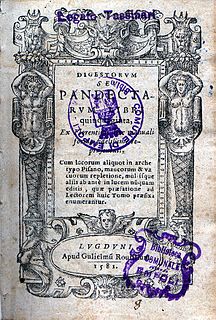Related Research Articles

The gens Livia was an illustrious plebeian family at ancient Rome. The first of the Livii to obtain the consulship was Marcus Livius Denter in 302 BC, and from his time the Livii supplied the Republic with eight consuls, two censors, a dictator, and a master of the horse. Members of the gens were honoured with three triumphs. In the reign of Augustus, Livia Drusilla was Roman empress, and her son was the emperor Tiberius.
The gens Gavia, or occasionally Gabia, was a Roman family of plebeian descent. It first appears in history during the first century BC, but none of its members obtained any of the curule magistracies until imperial times. The Gavi Arch at Verona was built in honor of one of the Gavii.

The gens Lucilia was a plebeian family at ancient Rome. The most famous member of this gens was the poet Gaius Lucilius, who flourished during the latter part of the second century BC. Although many Lucilii appear in Roman history, the only one known to have obtained any of the higher offices of the Roman state was Lucilius Longus, consul suffectus in AD 7.
The gens Pontia was a plebeian family at ancient Rome. Few members of this gens rose to prominence in the time of the Republic, but the Pontii flourished under the Empire, eventually attaining the consulship. Pontius Pilatus, as prefect of Judaea, is known for his role in the execution of Jesus.

The gens Licinia was a celebrated plebeian family at ancient Rome, which appears from the earliest days of the Republic until imperial times, and which eventually obtained the imperial dignity. The first of the gens to obtain the consulship was Gaius Licinius Calvus Stolo, who, as tribune of the plebs from 376 to 367 BC, prevented the election of any of the annual magistrates, until the patricians acquiesced to the passage of the lex Licinia Sextia, or Licinian Rogations. This law, named for Licinius and his colleague, Lucius Sextius, opened the consulship for the first time to the plebeians. Licinius himself was subsequently elected consul in 364 and 361 BC, and from this time, the Licinii became one of the most illustrious gentes in the Republic.
The gens Papiria was a patrician family at ancient Rome. According to tradition, the Papirii had already achieved prominence in the time of the kings, and the first Rex Sacrorum and Pontifex Maximus of the Republic were members of this gens. Lucius Papirius Mugillanus was the first of the Papirii to obtain the consulship in 444 BC. The patrician members of the family regularly occupied the highest offices of the Roman state down to the time of the Punic Wars. Their most famous member was Lucius Papirius Cursor, five times consul between 326 and 313 BC, who earned three triumphs during the Samnite Wars. Most of the Papirii who held office under the later Republic belonged to various plebeian branches of the family. Although the most illustrious Papirii flourished in the time of the Republic, a number of the family continued to hold high office during the first two centuries of the Empire.
The gens Terentia was a plebeian family at ancient Rome. Dionysius mentions a Gaius Terentilius Arsa, tribune of the plebs in 462 BC, but Livy calls him Terentilius, and from inscriptions this would seem to be a separate gens. No other Terentii appear in history until the time of the Second Punic War. Gaius Terentius Varro, one of the Roman commanders at the Battle of Cannae in 216 BC, was the first to hold the consulship. Members of this family are found as late as the third century AD.
Sextus Pedius was a Roman jurist during the late first and early second centuries. He was a contemporary to the Roman Jurists Aulus Ofilius and Massurius Sabinus, and also mentioned in the writings of Pomponius.

Alfenus Varus was an ancient Roman jurist and writer who lived around the 1st century BC.

The gens Mucia was an ancient and noble patrician house at ancient Rome. The gens is first mentioned at the earliest period of the Republic, but in later times the family was known primarily by its plebeian branches.

The gens Postumia was a noble patrician family at ancient Rome. Throughout the history of the Republic, the Postumii frequently occupied the chief magistracies of the Roman state, beginning with Publius Postumius Tubertus, consul in 505 BC, the fifth year of the Republic. Although like much of the old Roman aristocracy, the Postumii faded for a time into obscurity under the Empire, individuals bearing the name of Postumius again filled a number of important offices from the second century AD to the end of the Western Empire.
The gens Titia was a plebeian family at ancient Rome. The gens is rarely mentioned in the Republican period, and did not rise out of obscurity till a very late time. None of its members obtained the consulship under the Republic, and the first person of the name who held this office was Marcus Titius in BC 31.

The gens Pomponia was a plebeian family at ancient Rome. Its members appear throughout the history of the Roman Republic, and into imperial times. The first of the gens to achieve prominence was Marcus Pomponius, tribune of the plebs in 449 BC; the first who obtained the consulship was Manius Pomponius Matho in 233 BC.
The gens Rutilia was a plebeian family at ancient Rome. Members of this gens appear in history beginning in the second century BC. The first to obtain the consulship was Publius Rutilius Rufus in 105 BC.

The gens Juventia, occasionally written Jubentia, was an ancient plebeian family at Rome. After centuries of obscurity, the gens emerges into history with the appearance of Titus Juventius, a military tribune, in the beginning of the second century BC. The first of the Juventii to obtain the consulship was Marcus Juventius Thalna in 163 BC. But the family is renowned less for its statesmen than for its jurists, who flourished during the second century AD.
The gens Neratia or Naeratia was a plebeian family at ancient Rome, some of whom subsequently became patricians. The first of the gens to appear in history occur in the time of Augustus, but they did not rise to prominence until the time of Vespasian, when Marcus Neratius Pansa became the first to obtain the consulship. The Neratii married into the Roman imperial family in the fourth century.

The gens Plautia, sometimes written Plotia, was a plebeian family at ancient Rome. Members of this gens first appear in history in the middle of the fourth century BC, when Gaius Plautius Proculus obtained the consulship soon after that magistracy was opened to the plebeian order by the lex Licinia Sextia. Little is heard of the Plautii from the period of the Samnite Wars down to the late second century BC, but from then to imperial times they regularly held the consulship and other offices of importance. In the first century AD, the emperor Claudius, whose first wife was a member of this family, granted patrician status to one branch of the Plautii.
The gens Pontidia was an obscure plebeian family at ancient Rome. Members of this gens appear in history during the final century of the Republic, but none of them obtained any of the higher offices of the Roman state.
The gens Silia was a plebeian family at ancient Rome. Members of this gens are mentioned as early as the fifth century BC, but first to hold the consulship was Publius Silius Nerva, in the time of Augustus. The Silii remained prominent until the time of the Severan dynasty, in the early third century.
The gens Trebonia, rarely Terebonia, was a plebeian family at ancient Rome. Members of this gens are mentioned in the first century of the Republic, and regularly throughout Roman history, but none of them attained the consulship until the time of Caesar.
References
- ↑ Dictionary of Greek and Roman Biography and Mythology, vol. III, p. 19 ("Ofilius or Ofellius").
- ↑ Chase, p. 124.
- ↑ Livy, ix. 7.
- ↑ Digesta, 1. tit. 2. s. 2. § 44; 32. s. 55; 33 tit. 9. s. 3. §§ 5, 8; 50. tit. 16. s. 234. § 2.
- ↑ Cicero, Epistulae ad Familiares, vii. 21, Epistulae ad Atticum, xiii. 37.
- ↑ Zimmern, Geschichte des Römischen Privatrechts bis Justinian.
- ↑ Puchta, Cursus der Institutionen, vol. i. p. 427.
- ↑ Grotius, De Vitae Jurisconsultorum.
- ↑ Appian, Bellum Civile, v. 128.
- ↑ Broughton, vol. II, p. 404.
- ↑ Pliny the Elder, vii. 53. s. 54.
- ↑ Arrian, Epictiti Diatribae, iii. 22. § 27.
- 1 2 3 PIR, vol. II, p. 432.
- ↑ CIL IX, 2591.